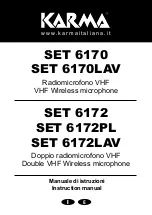
Description
This large-diaphragm condenser microphone has been designed on the
basis of experience AKG and its customers have gained worldwide over
the last decades using models such as the C 12, C 414B, and C 3000. The
C 4000B uses advanced, reliable components to meet the highest pro-
fessional demands and withstand even long-time, tough handling in the
studio.
The C 4000B provides the following features:
The dual-diaphragm transducer is a proven design that provides different
selectable polar patterns.
The diaphragms are made of a plastic foil that is gold-sputtered on one
side and prevents local shorts to the back electrode even at extremely high
sound pressure levels.
A switchable preattenuation pad allows you to increase the maximum
SPL capability of your C 4000B by 10 dB for distortion-free close-in record-
ings. Many mixing console input stages use small transformers that are
susceptible to overload, particularly at low frequencies. The C 4000B’s pad
prevents such overload.
A bass cut filter that is switchable on the microphone body reduces low-
end distortion due to uncontrolled rumble or wind noise even further. The
filter has a 12 dB/octave slope starting at 100 Hz.
The all-metal die-cast body shields the microphone very effectively
against RF interference when using it near radio transmitters or together
with wireless microphones or other communication systems.
With its high SPL capability, minimum distortion, and resistance to extreme
temperatures and high humidity, the C 4000B is a truly universal micro-
phone. A recessed switch on the microphone body allows you to select
three different polar patterns for a wide range of recording situations.
Each of these polar patterns is virtually frequency independent so that
reflected sound, too will be reproduced accurately and uncolored.
Recommended Applications
Most engineers use the cardioid polar pattern (center position of the polar
pattern selector) for most applications. It is a standard setting for recording
and gives excellent results on all kinds of voices and a wide range of instru-
ments.
If you need to mic up closely spaced instruments separately, you want
higher channel separation. Therefore, set the polar pattern selector to the
right-hand position for the hypercardioid polar pattern. This pattern is a
very good choice for concert sound applications because it rejects most of
the regenerated signals arriving at the microphone from the monitor loud-
speakers that are usually placed a little to the sides of the artist.
Set the polar pattern selector to omnidirectional (left-hand position) for
“all around the mic” recording, high quality ambience (audience sound)
miking, or far-field recording in exceptionally good large or small recording
rooms, etc.
Although the microphone capsule is shock mounted internally, you can use
the supplied H 100 “spider” suspension to reduce vibrational noise from
the stand or other sources even further. Remember to insert the cable into
one of the two grooves at the rear end of the outer ring for strain relief. This
removes mechanical pull from the connector and reduces vibrational noise
that may be transmitted to the microphone by the cable.
You can use the supplied W 4000 foam windscreen both as a windscreen
for outdoor recording and as an additional pop screen for vocal recording.
The wind/pop screen causes almost no change in the frequency response
of the microphone. A careful, subjective comparative listening test will be
the best way to decide whether to use the windscreen or not.
Powering
The C 4000B operates on any phantom power source to DIN 45 596 /
IEC 268-15. This standard specifies a positive voltage of 12, 24, or 48 VDC
on the two audio lines referenced to the cable shield. Alternatively, you can
operate the microphone on any DC voltage between 9 and 52 V fed to the
microphone via standard phantom power wiring.
5






































